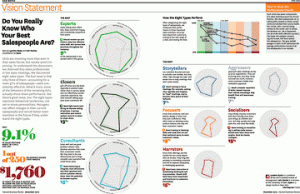Despite vast amounts of money that companies are spending in sales training in order to increase sales performance, the outcome often seems rather poor. Several studies have been conducted to find the success formula for effective selling, but as this is quite complex and evolving a topic, one does not need to expect researchers to arrive at a major breakthrough. Instead of providing the “grand truth” of sales, research contributes ‘peu-a-peu’ to a ‘wholer’ picture of sales.
An interesting article recently appeared in HBR (Harvard Business Review) called ‘Vision Statement: Do You Really Know Who Your Best Salespeople Are?‘ that is written by researchers Lynette Ryals and Iain Davies from Cranfield School of Management. Brief introduction through a quote from the article:
“CEOs are investing more than ever in their sales forces, but results aren’t improving. To understand this disconnect, we observed 800 sales professionals in live sales meetings. We discovered eight sales types. The bad news is that only three of them—accounting for a mere 37% of salespeople—were consistently effective. What’s more, some of the behaviors of the remaining 63% actually drove down performance. But there’s good news, too: The eight types represent behavioral tendencies, not set-in-stone personalities. Managers can effect changes in their current salespeople and recruit better team members in the future if they understand the eight types.” (Ryals & Davies 2010)
Eight types of salespersons were identified: Experts, Closers, Consultants, Storytellers, Aggressors, Focusers, Socializers, and Narrators. Being consistently effective, the first three types clearly outperformed the rest. One key point seems that these three have a more balanced skill set compared to the rest. The article provides some guidance and ideas that sales managers can and should take into consideration when hiring, training, and guiding their sales force. In other words, this article provides some possible answers and contributes to developing personal selling and sales management.
The challenge with salespeople however, is not restricted to any one area, such as: recruitment, training, guidance, compensation, or rewarding, nor is it restricted to any one level, such as: salesperson, sales team, sales management, sales force, or firm. In fact, it is a combination of all of these, plus the (potential) customer of course, as well as situation and context. Additionally, all of these are in constant movement, which adds to the complexity. Hence, there is no one way of looking at things in order to in a sustainable way improve sales performance, but rather it is a complex undertaking that requires optimally the combined views of researcher, consultant and salesperson.
Researchers can study the phenomena and arrive at findings and answers, consultants adopt the role of problem solver (thereby hopefully also looking at purchasing and the buyer or customer when needed), and salespersons (incl. sales manager level) have the experience and knowledge to assess what fits their business, customers and industry and they are responsible for implementation. Resolving challenges with sales and salespeople requires multi-talented and multi-skilled persons or teams that optimally are able to provide clear answers and advice that can be implemented. In other words, the challenge with studying salespeople foregoes the challenge with salespeople.

